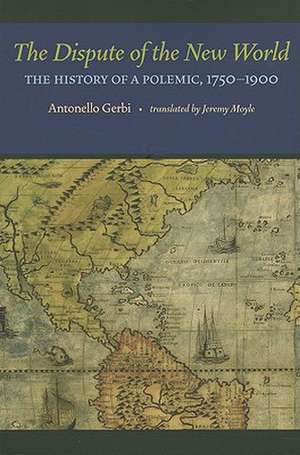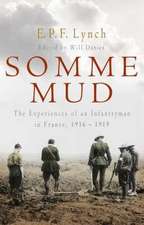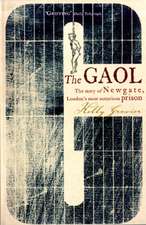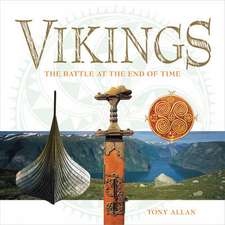The Dispute of the New World: The History of a Polemic, 1750–1900
Autor Antonello Gerbi Traducere de Jeremy Moyleen Limba Engleză Paperback – 20 iun 2010
When Hegel described the Americas as an inferior continent, he was repeating a contention that inspired one of the most passionate debates of modern times. Originally formulated by the eminent natural scientist Georges-Louis Leclerc, Comte de Buffon and expanded by the Prussian encyclopedist Cornelius de Pauw, this provocative thesis drew heated responses from politicians, philosophers, publicists, and patriots on both sides of the Atlantic. The ensuing polemic reached its apex in the latter decades of the eighteenth century and is far from extinct today.
Translated in 1973, The Dispute of the New World is the definitive study of this debate. Antonello Gerbi scrutinizes each contribution to the debate, unravels the complex arguments, and reveals their inner motivations. As the story of the polemic unfolds, moving through many disciplines that include biology, economics, anthropology, theology, geophysics, and poetry, it becomes clear that the subject at issue is nothing less than the totality of the Old World versus the New, and how each viewed the other at a vital turning point in history.
Translated in 1973, The Dispute of the New World is the definitive study of this debate. Antonello Gerbi scrutinizes each contribution to the debate, unravels the complex arguments, and reveals their inner motivations. As the story of the polemic unfolds, moving through many disciplines that include biology, economics, anthropology, theology, geophysics, and poetry, it becomes clear that the subject at issue is nothing less than the totality of the Old World versus the New, and how each viewed the other at a vital turning point in history.
Preț: 492.87 lei
Preț vechi: 579.85 lei
-15% Nou
Puncte Express: 739
Preț estimativ în valută:
94.31€ • 100.85$ • 78.63£
94.31€ • 100.85$ • 78.63£
Carte tipărită la comandă
Livrare economică 17 aprilie-01 mai
Preluare comenzi: 021 569.72.76
Specificații
ISBN-13: 9780822960812
ISBN-10: 0822960818
Pagini: 720
Dimensiuni: 152 x 229 x 43 mm
Greutate: 1.02 kg
Ediția:Reissue
Editura: University of Pittsburgh Press
Colecția University of Pittsburgh Press
ISBN-10: 0822960818
Pagini: 720
Dimensiuni: 152 x 229 x 43 mm
Greutate: 1.02 kg
Ediția:Reissue
Editura: University of Pittsburgh Press
Colecția University of Pittsburgh Press
Recenzii
“Vast and fascinating. . . . Now at last, updated and admirably translated by Dr. Jeremy Moyle, we have it in English; and none too soon, for this is a book which should be on the shelf of everyone who is curious not only about the European image of America but also about the history of man’s attitude to man. Dr. Gerbi’s study is a monument both to erudition and to fastidious wit; the outcome of years of reading and reflection by a historian of ideas who is at once playful and wise.”
—New York Review of Books
—New York Review of Books
“Jeremy Moyle’s excellent translation not only renders more accessible an outstanding contribution to the history of ideas but also presents a revised and enlarged version. . . . An imaginative, rich, masterly study of prime importance in the history of Western thought and of the Americas.”
—Journal of American History
—Journal of American History
“Gerbi’s book is fascinating. His scholarship is vast. . . . A superb and significant study dealing with an aspect of the Enlightenment that is usually ignored. The work will be of interest to a wide range of scholars in the history of ideas.”
—Journal of the History of Philosophy
—Journal of the History of Philosophy
Notă biografică
Antonello Gerbi (1904–1976) was a specialist on the history of political ideology and the author of several books, including Nature in the New World: From Christopher Columbus to Gonzalo Fernández de Oviedo.
Descriere
When Hegel described the Americas as an inferior continent, he was repeating a contention that inspired one of the most passionate debates of modern times. This thesis drew heated responses from politicians, philosophers, publicists, and patriots on both sides of the Atlantic. The ensuing polemic reached its apex in the late eighteenth century and is far from extinct today. The Dispute of the New World is the definitive study of this debate.










